Lysine is an essential amino acid found in both plant and animal-based foods. While many lysine supplements are on the market, some manufacturers claim that their products are better than others. The best lysine supplements for cats should have a high concentration of lysine, be easy to administer and be free of harmful additives.
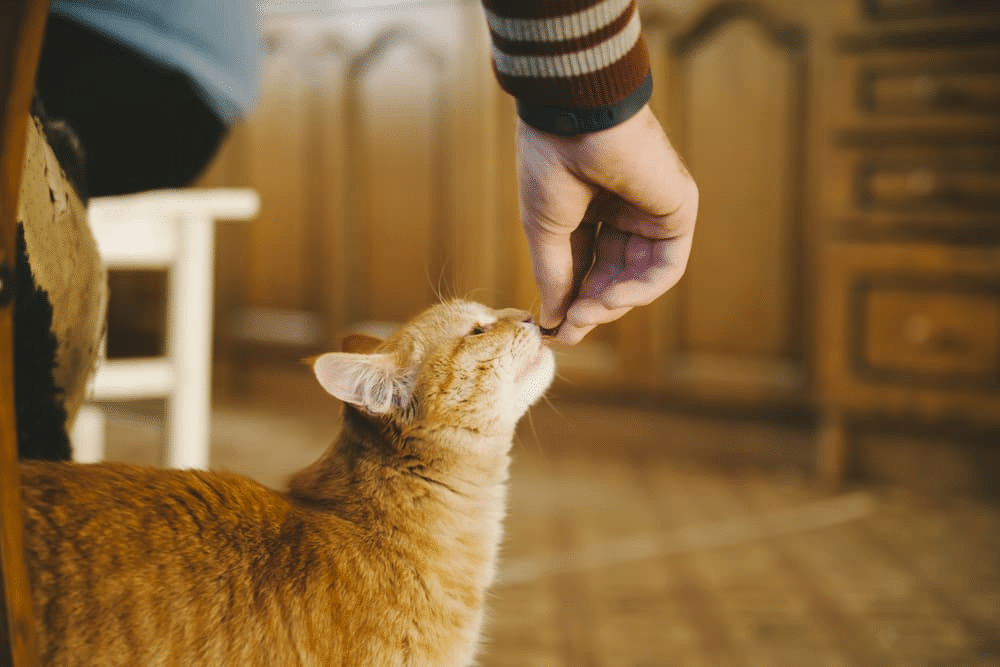
Source: google.com
Lysine: What Is It?
Amino acids include lysine. Like humans, cats cannot generate lysine independently and must obtain it from their diet or, occasionally, supplements. You can find this necessary mineral in various cat feeds. On the ingredients label, look for Lysine, L-Lysine, L-Lysine Hydrochloride, or L-Lysine Monohydrochloride. You can offer a lysine supplement rather than switching your cat’s food if it has feline herpes or if you have been told that it needs more lysine in its diet. This will give you more control and accuracy over the dosing of this mineral.
What Quantity Of Lysine Should I Feed My Cats?
The amount of lysine that veterinarians advise cats to consume daily is 500 mg. At least one study found that doing so reduced the incidence of conjunctivitis brought on by the FHV-1 virus. Most supplements are dosed appropriately and advise providing up to 250 mg to kittens and 500 mg to adult cats. It would help to consider any lysine derived from food when determining how much to provide.
L-Lysine: Can Cats Take It Daily?
They are additionally thought to strengthen the immune system, and L-lysine aids calcium uptake and absorption. As a result, it is administered as a daily supplement and is thought safe for cats to receive daily.
Dietary Supplements
Most supplements are available in many formats, so you may pick the one your cat tolerates best, with the desired vitamins, minerals, and other substances.
The forms of lysine supplements that are most frequently seen include:
Powder
The most accessible supplement to take in is probably powder. It can be blended with wet or dry food or even a cat treat to disguise any flavour, scent, or texture. It does take some effort to estimate the powder amount. However, most powdered supplements include a scoop or dose recommendations using teaspoon amounts. While some so-called powders are more granular and difficult to conceal even in wet canned food, some particularly picky and observant cats may still notice the off flavour and forsake their diet.
Liquid
Liquids are less frequent than powders and are typically delivered by the cat owner by squirting the medication into the cat’s mouth. Some businesses sell the liquid already in a metered and marked syringe, though it is typically sold in a bottle with an accompanying syringe. A liquid syringe is quick and practical if your cat is somewhat tolerant, but it’s trickier to store a half-full syringe than a tub of supplement powder.
Soft Chews
If your cat is the type to at least attempt to eat anything you give it, soft chews can be a decent choice. Typically, chicken liver or chicken is used to flavour them. They have a chewy texture, making it simple to offer your cat what they perceive as a reward if they like the flavour. It can be challenging to smash or break up the soft chews so that you can add them to wet food if your cat doesn’t eat them directly.
Treats
Biscuits are another form of a treat. In addition to lysine, chews and biscuits also contain other substances. It is essential to inspect the ingredients listed there because they might be utilised to flavour the chew or act as a binder to keep the supplement inside the treat until it is eaten. Treats are helpful if your cat accepts them and enjoys the flavour. They are incredibly challenging to give if not.
Paste Gel
A paste gel can be fed to cats, applied to their gums, or even to their paws. It has the consistency of a gel. The gel can be applied to the cat’s paws to encourage it to lick them clean and absorb the lysine ingredient, but this method isn’t dependable or accurate and can make a sticky mess all over the house.
The Ideal Lysine For Cats
1. Cat L-Lysine Powder by NOW Pet Health
This powder from NOW might be just what you need if you want a substantial supply of dietary lysine that is simple to incorporate into wet or dry cat food. It is produced by a renowned family-run business that has achieved National Animal Supplement Council (NASC) certification for quality.
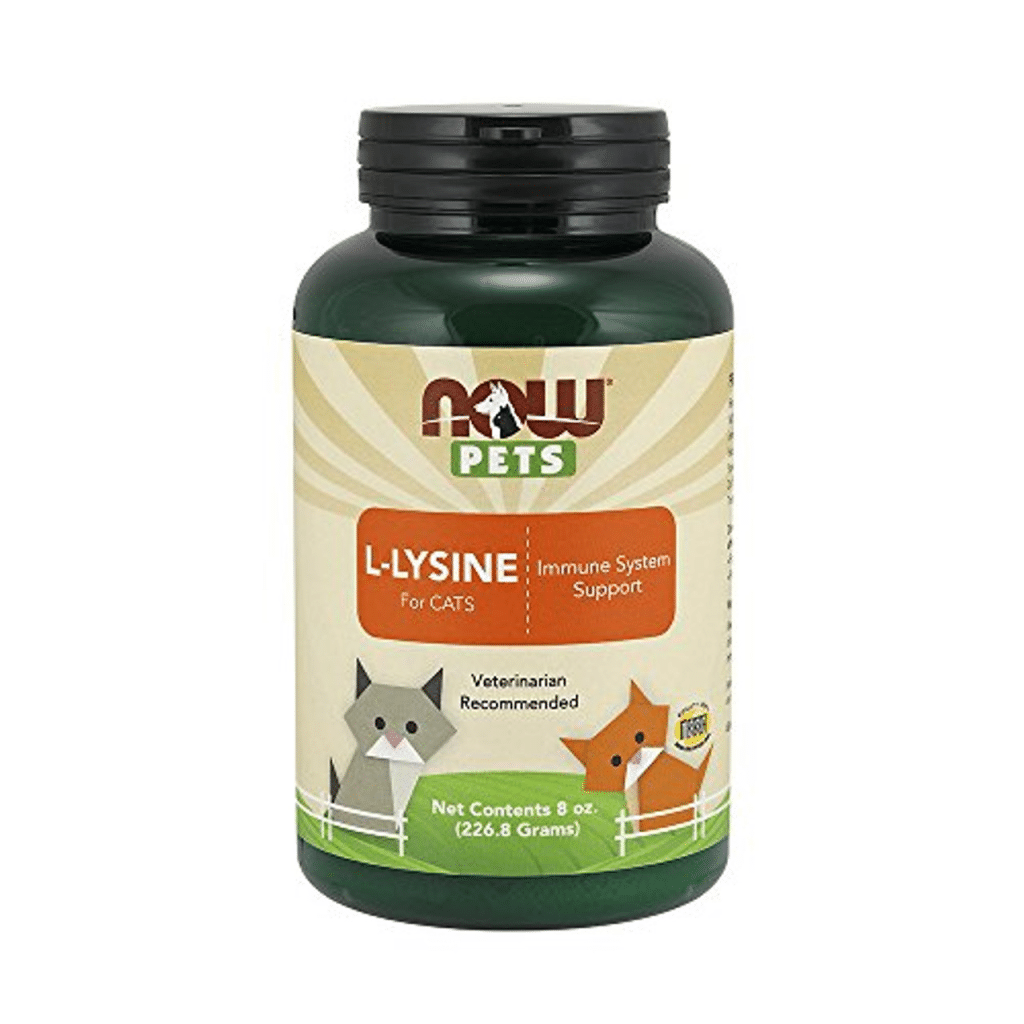
Source: google.com
Pros:
- Dependable and NASC-certified item
- Well dissolves in wet food
- only contains lysine
Cons:
- Expensive
- Some cats may experience an allergic reaction.
2. L-Lysine Immune Support Cat Supplement from Strawfield Pets
This powder supplement from Strawfield contains high-quality lysine and is made to support the immune system, general health, and treatment of feline herpes.
It also prevents eye infections in kittens and cures upper respiratory infections, colds, cough, sneezing, runny nose, congestion, and cough in adult and elderly cats.
This product is perfect for kittens, adults, and elderly cats of all breeds because it has a natural chicken liver flavour.
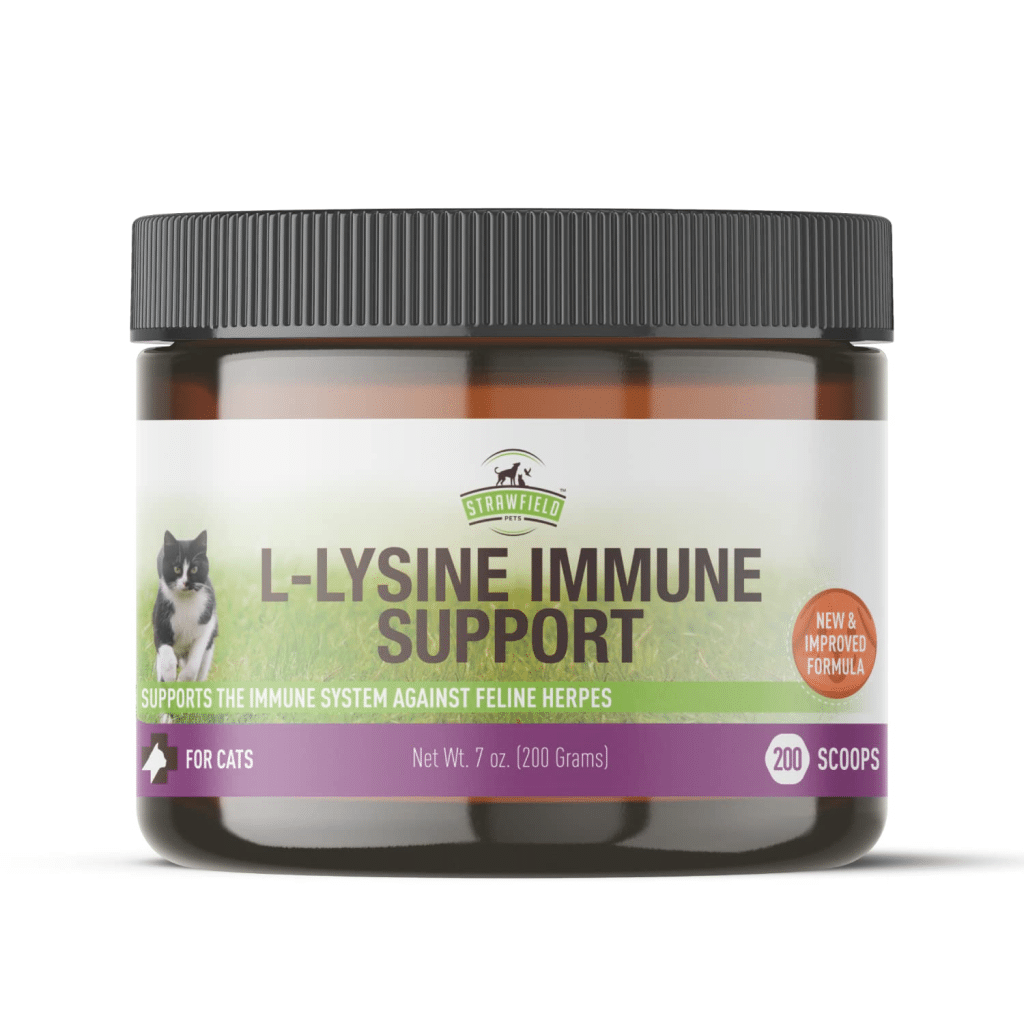
Source: google.com
Pros:
- Has a sufficient amount of lysine
- Made in the USA
- Picky diners enjoy it
Cons:
- Its gritty texture has raised some concerns from several reviewers.
- Due to dosage/servings, you might need to buy more regularly.
3. Felo Lysine Cat Supplement by Thomas Labs
100% lysine is present in Thomas Labs Felo Lysine Powder Cat Supplement, an unflavored powder supplement. It doesn’t contain any flavourings or additional additives. Although a larger quantity is needed than with some other powders, the large jar should last long in a home with just one cat. Although it is costly, the jar does come with a scoop, which is not often the case.
This powder needs a full teaspoon for adult cats, unlike other powders that only need a portion. Additionally, it lacks flavour and is challenging to mix with a treat. A teaspoon of dry powder sprinkled on top of a food sachet can cause you to serve other food because observant cats can immediately detect it. It is a pricey option for lysine powder supplementation due to the quantity you must feed and the cost.
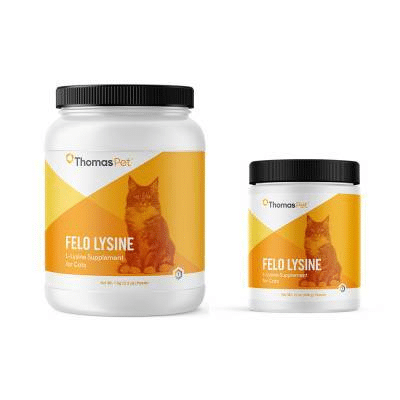
Source: google.com
Pros:
- Fully lysine
- You can sprinkle the powder on your cat’s food.
- Contains a spoonful
Cons:
- Expensive
- The recommended dosage calls for a lot of powder.
4. Tuna & Chicken Lysine Immune Health+ by PetHonesty
Supplements are available as liquids, tablets, and powders. While tablets and chews are helpful for cats that consume anything that smells like chicken, it can be challenging to get them down to all animals. Additionally, many cats may reject liquids, so you must syringe them into their mouths to keep them from spitting them out.
A flavoured powder version of PetHonesty Lysine Immune Health+ Tuna & Chicken Flavored Supplement for Cats is available. Because it has a tuna and chicken flavour, it shouldn’t take away from the overall flavour of the meal and can be added to your cat’s favourite treats to make them more appealing.
Water for cats should always be fresh and available around-the-clock. You should never add vitamins or other additives to the water. The flavour of the supplement may deter your cat from drinking from the bowl in the future if they don’t like it.
The PetHonesty powder also includes omega fatty acids and quercetin, which are intended to support the immune system. This combination is particularly advantageous for allergic cats and in the winter when cold symptoms frequently linger.
Although the powder is quite pricey, and you do have to measure scoops and add it yourself to food or treats, it is suitable for cats of all ages, is suitable for picky cats because it can be added to a treat of their choosing, and contains a good mixture of immune support ingredients, so it is our choice as the best overall lysine supplements for cats.
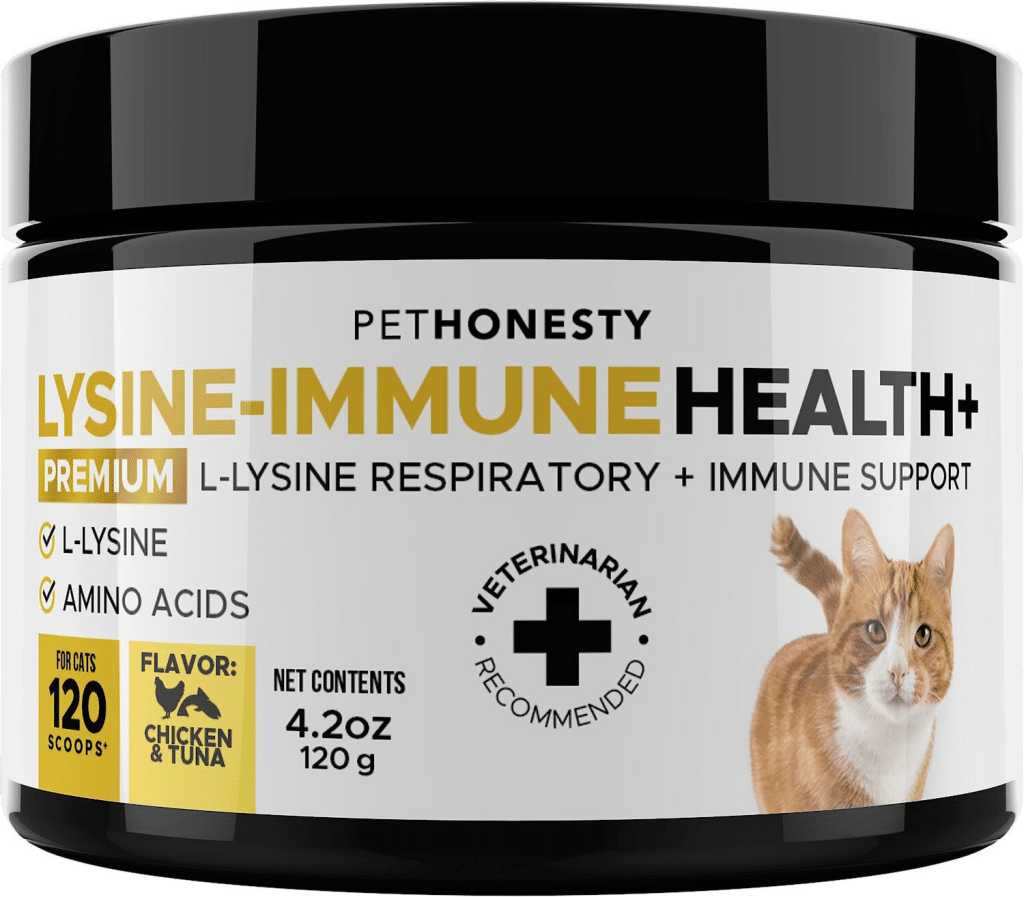
Source: google.com
Pros:
- You can include powder supplements in your sweets or cuisine.
- Suitable for adult, senior, and kitten cats
- contains quercetin and omega fatty acids.
Cons:
- Not as handy as a chewable or pill
- Quite a pricey tub
5. Chewable Vetri-Lysine Plus from VetriScience
Kittens needing a lysine boost now enjoy a tasty and nourishing snack thanks to VetriScience Laboratories. Most cats appear to like the tasty chicken flavour of these chews.
Seal the package correctly, according to some reviews, to prevent the snacks from drying out.
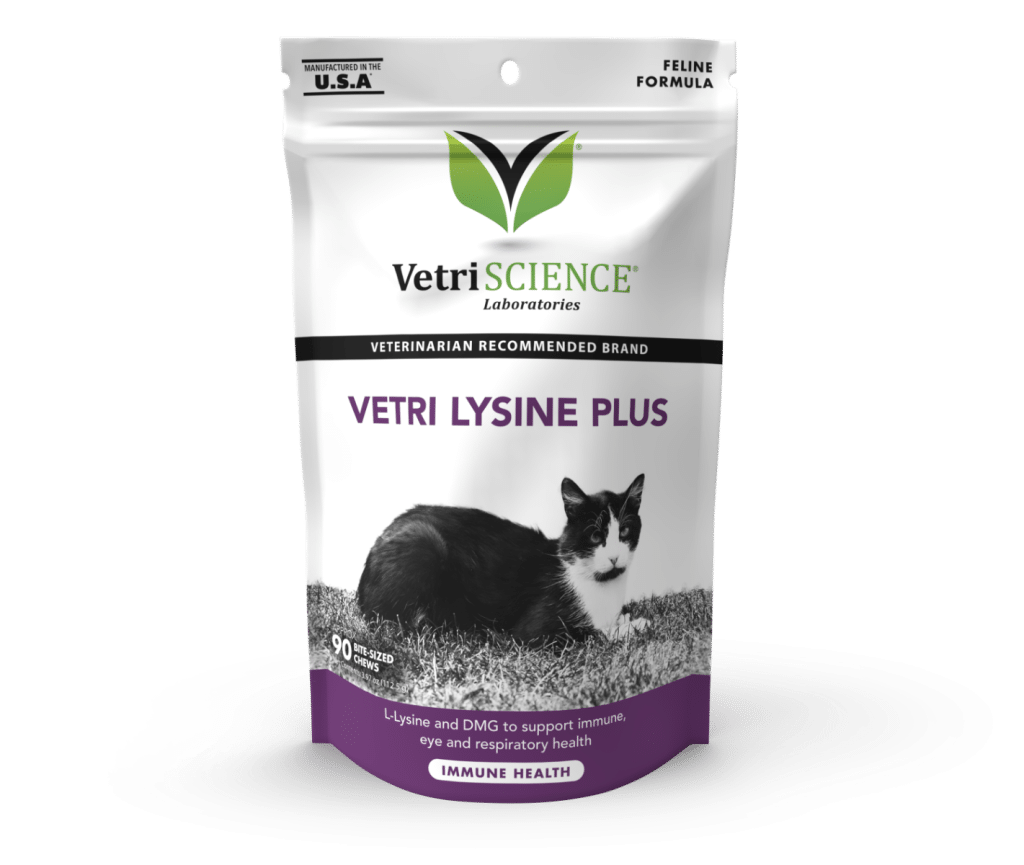
Source: google.com
Pros:
- Cats enjoy the flavour.
- Created and produced in the US
- Simple to sporadically add to a cat’s diet when stress levels are at their highest.
Cons:
- Includes several unwelcome ingredients, such as soy lecithin
- Maltrodextrin and vegetable oil, while easily breakable into tiny pieces for some cats but not correctly “bite-sized,” can dry out.
6. Cats’ Oral Powder by Viralys
The feline variant of the herpes virus has typically been treated and managed using Viralys oral powder. As previously indicated, there is some conflicting information regarding whether lysine is a beneficial dietary supplement for cats with the herpes virus.
However, this item is still of excellent quality and offers a reliable source of lysine if your pet requires it for a boost in immunity or for another reason.
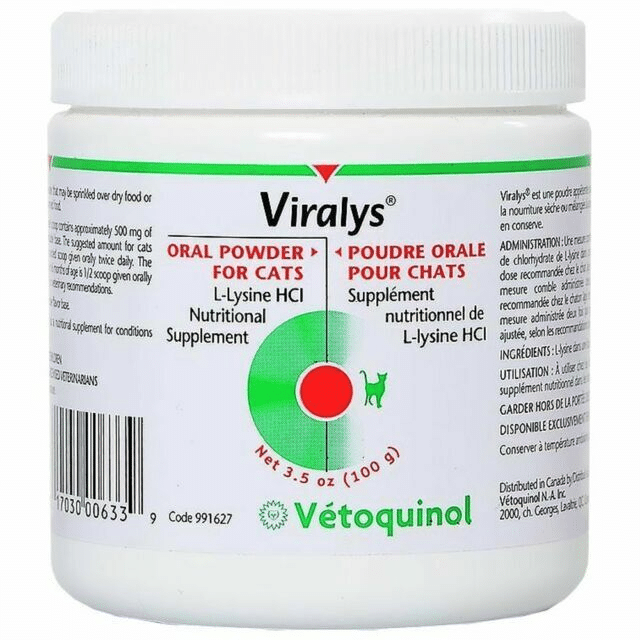
Source: google.com
Pros:
- Vet-approved
- Easy to incorporate into dry or wet cat food
Cons:
- Not all cats enjoy the flavour.
- Expensive
7. L-Lysine Cat Chews by Optixcare
As well as being healthy for eye health, lysine is believed to help prevent or minimise feline herpes flare-ups. Veterinarians have long used L-Lysine to treat cats who have the Herpes virus. Each Optixcare L-Lysine Cat Chew contains the 500mg of lysine that veterinarians advise cats to consume daily.
This means that while Optixcare suggests giving your cat one or two chews each day, as needed, you should only need to give your cat one of the chews per day. A single, reasonably priced tub will last for one to two months.
Although the chews do have a chicken flavour to appeal to feline palates, particular cats will always reject a flavour, regardless of how delectable it may be. The cube-shaped chews are enormous, so you might need to cut or split them up, especially if you give them to a tiny cat or kitten. They do cost more than some of the powders.
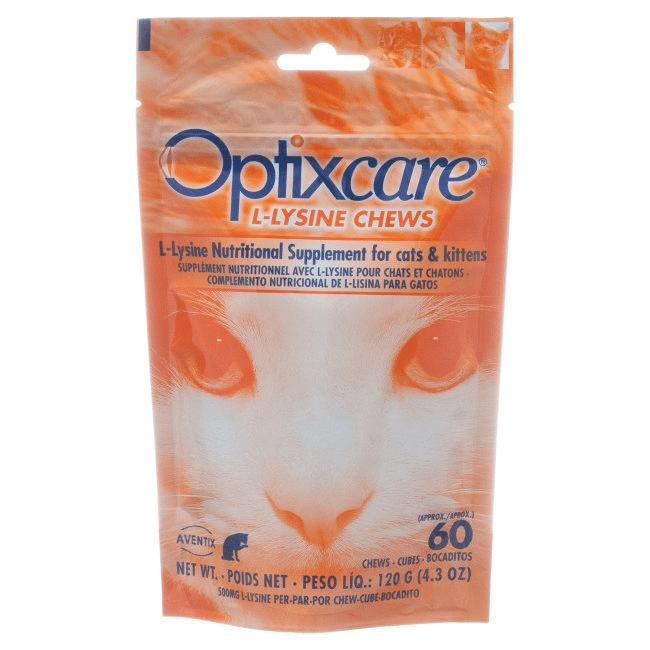
Source: google.com
Pros:
- Flavoured soft chews with chicken
- Include 500 mg of lysine in each chew, as recommended
Cons:
- Very huge
- Exercise costs more than powder.
8. L-Lysine Amino Acid Support Cat Supplement, 21st Century Chew
L-Lysine Hydrochloride is included in the 21st Century Essential Pet L-Lysine Amino Acid Support Soft Chews, along with various flavours and binders, including brewers dried yeast, which may cause allergies in particular cats. Although the small amount in each chew and your cat’s modest intake mean that canola oil, a somewhat contentious element in cat diets and treats, is on the list of ingredients, it should be safe at these levels and is generally regarded as safe by experts.
Despite being flavoured, not all cats seem to enjoy the chews, but they are manageable in size and can be broken up into wet food to fool even the most intelligent felines. A bottle costs a fair amount and provides enough supplies for three months at the suggested levels. The average cat will require one chew each day based on the twenty-first Century recommendation to feed one pill per 10 pounds of cat weight.
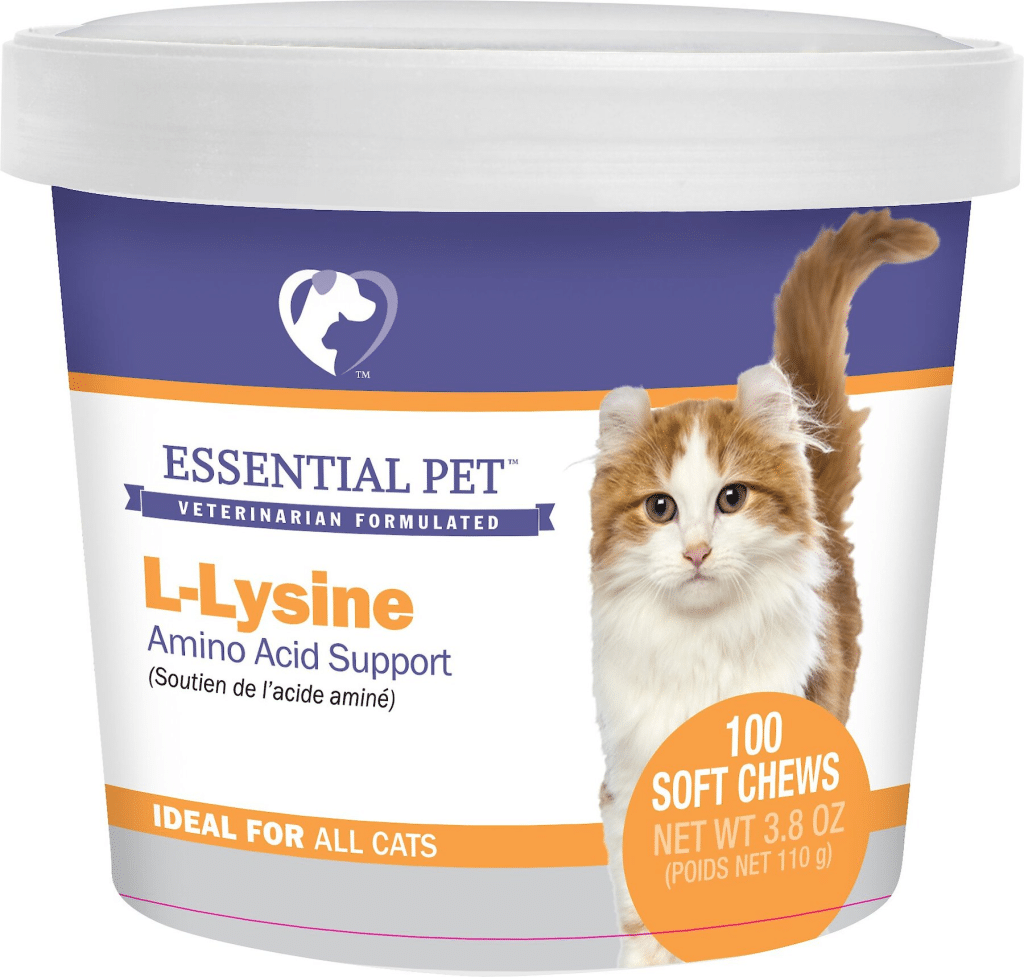
Source: google.com
Pros:
- Good value
- Supple chews
Cons:
- Has specific controversial components, albeit in minor amounts.
- Fewer cats prefer this flavour than others.
9. Vetri Lysine Plus by VetriScience Laboratories
VetriScience Laboratories Vetri Lysine Plus was our preferred lysine supplement for cats overall. It assists the respiratory system, eyesight, and immune system. You can keep your cat’s body strong and healthy by providing protection.
These vitamins come from 120 fish-shaped chews with a chicken flavour. They will make an excellent daily treat that your cats may look forward to because cats appear to appreciate the flavour.
It contains DMG in addition to L-lysine for help in hormone and antibody synthesis and L-lysine for immunity. These amino acids enable collagen production, tissue healing, and enzymatic processes crucial to the immune system.
This dish is intended for multi-cat households with cats of any age, from kittens to senior citizens. We anticipate that you will like this product because it satisfies the requirements of practically all domestic cats. Due to dietary requirements, it won’t work for all cats, so double-check all the components.
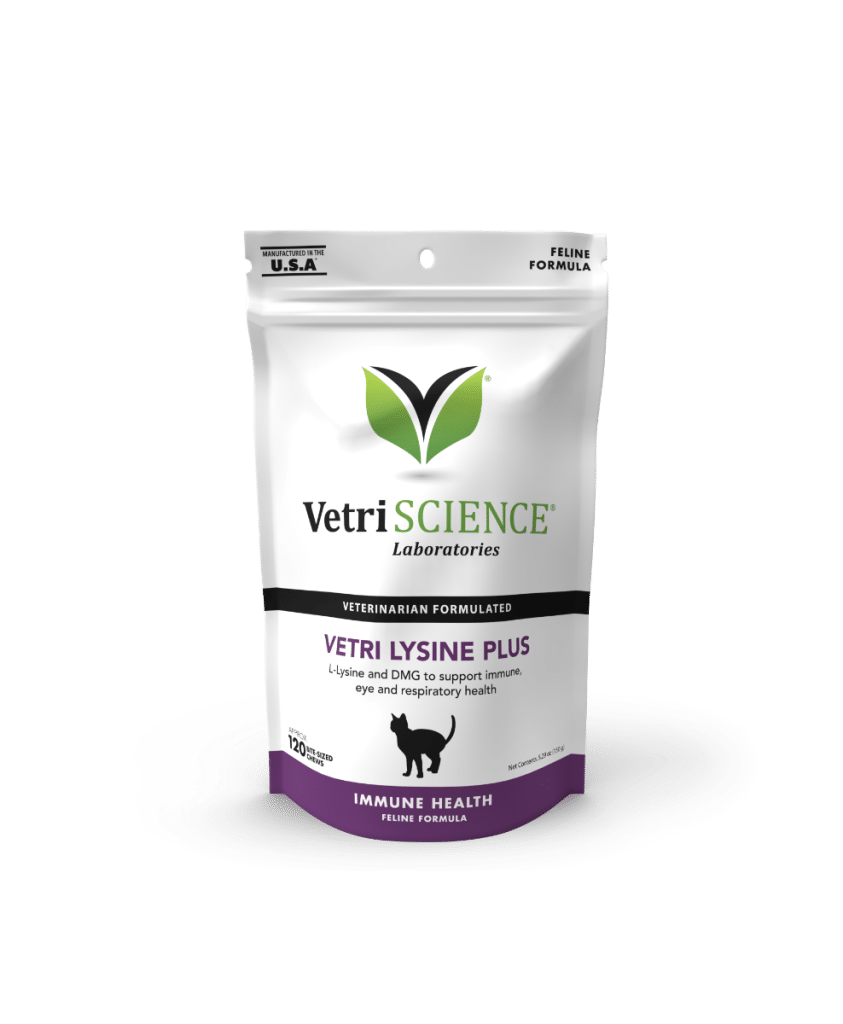
Source: google.com
Pros:
- Admitted DMG
- Favours the production of antibodies
- Facilitates enzymatic processes
- Formula ideal for adult, elderly, and kitten cats
Cons:
- Some components may not be effective for all cats.
10. Viralys L-lysine Oral Gel with Vetoquinol
Even if the Vetoquinol Viralys L-lysine Oral Gel is a little pricy, we believe it is worth the purchase. With oral gel and chews available in one order, it is an excellent value if you know that your cat benefits from these dietary requirements.
The chicken liver chews have a flavour that cats like. Both items are intended to decrease respiratory illness symptoms and boost immunity generally. Additionally, it clears the sinuses and lessens conjunctivitis and eye inflammation.
Ultimately, we discovered that this solution benefited cats who frequently sneeze and had muck in their eyes. Yes, it can significantly increase the immunity of almost any indoor cat.
We discovered this would be especially beneficial in houses with multiple cats, where each preferred a different way to eat. Each item is produced in the USA.
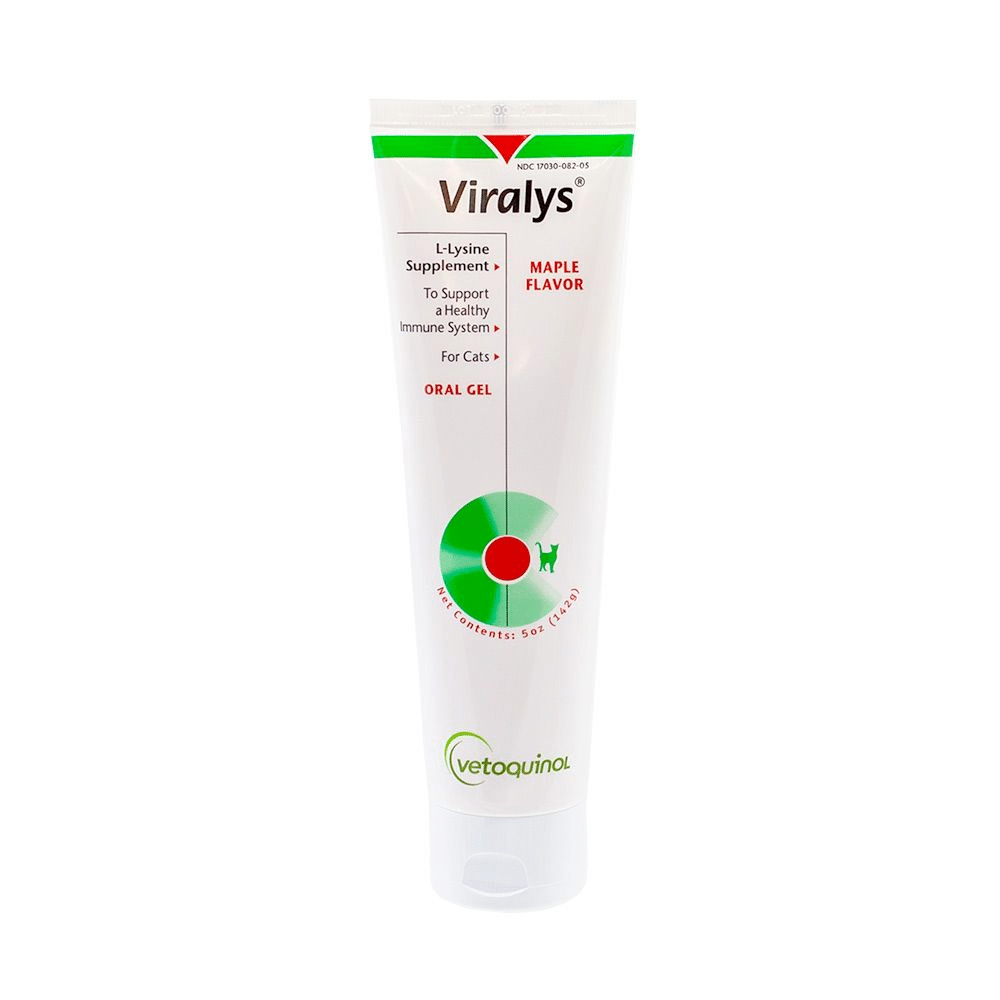
Source: google.com
Pros:
- Produced in the USA
- Combination of chew and gel
- Super for several cats
Cons:
- Pricey
Conclusion
Amino acids are essential for the overall health of all animals (and humans, for that matter). But some cats don’t make or acquire enough of the correct amino acids, including lysine, due to age, disease, nutrition, and lifestyle.
Fortunately, several fantastic lysine supplements could improve your cat’s feelings and performance. Suppose you’re unsure; present this list to your veterinarian to receive advice before making a purchase. Also, read our other in-depth evaluations for suggestions on additional cat items.
FAQs
What is the difference between Lysine and L-lysine?
Lysine is an essential amino acid that is important for the body to make proteins. It can also be used as a supplement to help muscle growth since it helps with protein synthesis.
L-lysine is a form of lysine synthetically created in the lab. It has a similar chemical structure to natural lysine, but the difference is that it doesn’t have any impurities found in natural lysine.
How long does it take for L-lysine to work on cats?
L-lysine is an amino acid that is responsible for the production of protein in the body. It is a natural and essential amino acid that helps various bodily processes.
The recommended dose of L-lysine for cats is 100 mg per pound of body weight. For example, if your cat weighs 10 pounds, it should take 1000 mg of L-lysine daily to keep its immune system healthy.
It usually takes about three weeks for L-lysine to work on cats.
Can you put lysine on dry cat food?
The answer is no. You can’t put lysine on dry cat food because the protein will be digested by the cat’s stomach acids before it reaches the intestines.
